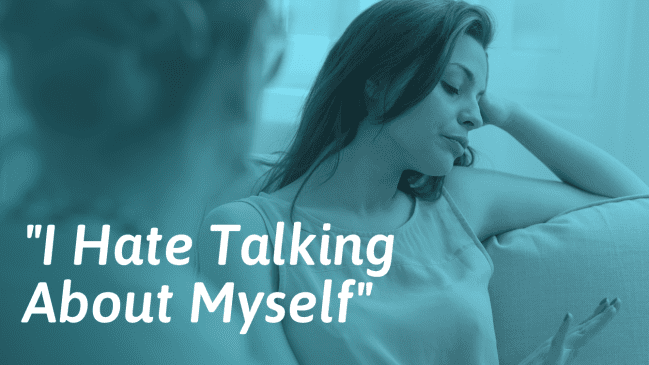“I hate the ‘getting to know you’ type of events. ‘Let’s go around the room and introduce ourselves’. It’s my idea of hell”
Talking about yourself can feel like a huge social challenge, particularly in a group or amongst people you don’t know well. Talking about yourself can bring up a range of anxieties, for example:
“Did I talk about myself too much?”
“What if I can’t think of anything to say?”
“Won’t everyone think I’m boring?”
“I’m going to sound like I’m bragging”
“What if everyone else is so much more exciting?”
Almost all of us have these thoughts at some time in our lives. The good news is that talking about yourself is a skill that you can train. Learning to open up can help you to build the kind of strong, supportive social network you might have been looking for.
In this article, I’m going to look at why talking about yourself is an important social skill and show you some of the strategies that helped me learn to talk about myself in a way that feels relaxed and entertaining.
1. Understand why talking about yourself is important
Many of us dislike talking about ourselves when we don’t really know what we’re aiming for. We assume that other people are unlikely to care about the details of our lives and so try to avoid the topic altogether.
Talking about yourself is a key ingredient in letting people like you. Sharing personal information lets others feel that you trust them and encourages them to open up to you. Studies show that sharing personal information about yourself makes others like you more. It also encourages them to open up about themselves more, which makes them more enjoyable for you to be around.[1]
It might help to think of talking about yourself as an exchange. Sharing information about yourself shows that you trust and like the other person. The other person sees that and offers some trust and liking in return. This allows you to start building a friendship.[2]
Aim for a balance in your conversations where you let the other person talk, then share a little about you, then go back to learning about them, and so on.
2. Challenge your self-critical voice
If you ever feel overwhelmed or intimidated that someone else might actually be interested in hearing about your life, you might benefit from improving your confidence. Lots of people find that their internal voice tells them that others aren’t really interested. For example, it might say
“I know they asked what I do for a living, but they don’t really care so I shouldn’t talk for too long”
This makes it difficult for you to talk about yourself and feeds into your feelings of insecurity.
Learning to like yourself enough to talk about yourself positively can take time and effort. We have tips on how to feel more confident in social settings and have ranked the best books on self-confidence.
I think the most important tip when you’re trying to improve your confidence is to realize that it’s going to take a long time and to be proud of each and every step forward you make.
To make talking about yourself easier while you’re working on your confidence, try to practice in small stages. Again, celebrate your achievements. You might find preparing answers to some questions can make it easier.
3. List topics you feel comfortable talking about
Lots of people struggle to talk about themselves because they are generally very private people. It is easy to feel that anything personal about you is also private.
Learn to tell the difference between things you believe are private and those you are just in the habit of keeping to yourself.
Make a list of topics about yourself that you feel are safe to talk about. Keeping to facts, rather than feelings can often feel safer, but doesn’t let people get to know you as well.
4. Gradually talk about more personal things
Good and safe topics to talk could about include pets, places, music, or food. These are topics you can discuss at different levels of privacy. For example, you might start by talking about where you live but move on to where you dream about living as you feel more comfortable. You can do the same thing with where you went on holiday or with pets you have had or would like to have.
We’ll explain how to do this in detail in our guide on how to make interesting conversation.
What if I don’t want to share any personal information?
If you really struggle to find anything in your life that doesn’t feel private, you might want to think about why you have such a strong desire for privacy. Sometimes, your past experiences or your psychological make-up can make it difficult to feel comfortable sharing information about yourself. For example, people with an avoidant attachment style often dislike talking about themselves.[3] Working with a qualified therapist might help you to work through some of these problems and feel more confident in personal conversations.
We recommend BetterHelp for online therapy, since they offer unlimited messaging and a weekly session, and are cheaper than going to a therapist's office.
Their plans start at $64 per week. If you use this link, you get 20% off your first month at BetterHelp + a $50 coupon valid for any SocialSelf course: Click here to learn more about BetterHelp.
(To receive your $50 SocialSelf coupon, sign up with our link. Then, email BetterHelp’s order confirmation to us to receive your personal code. You can use this code for any of our courses.)
5. Realize talking about yourself isn’t bragging
If you worry about coming across as bragging, consider talking about things others have said about you, instead of having to come up with your own words.
Many of us worry that we come across as bragging. We might have been told not to ‘show off’ as children or we might know someone whose constant self-praise makes them uncomfortable to be around. We don’t want to be that person.
It can be useful to recognize the big gap between talking about yourself normally and being a braggart. Think about conversations with people who you enjoy talking about and notice how they talk about themselves.
People who come across as self-centered or bragging often display several key characteristics:
- They use extreme language. Everything they do is “the best” or “the most”
- Everything they say about themselves is positive. They don’t discuss things that aren’t aimed at making themselves look good. For example, they might tell you that they went to an expensive resort on holiday but you won’t know whether their favorite color is red or green
- They don’t listen to or acknowledge other people’s experiences. They will interrupt someone else’s story with one of their own
Whenever you find yourself worrying about this, remind yourself that almost no-one who worries about bragging actually does it.
6. Share how things you do make you feel
You might feel awkward talking about yourself because you’re worried that others might judge you or think it’s silly.
Try sharing how the things you do make you feel. Recognize that others might not enjoy those activities, but they probably just have different ways of finding their sense of enjoyment and fulfillment.
Telling people things we dislike about ourselves feels more risky and uncomfortable than telling them things we are proud of.[4] Learning to not feel judged starts with developing the inner confidence that you are starting to move your life in the right direction. Remind yourself of why your activities are right for you. For example, rather than thinking
“I can’t tell people I play computer games in the evening. They’ll think I have no friends”
Try to remind yourself why you like computer games
“I can tell people how much I like computer games and explain how you have to find the right tool to solve the puzzle and how it’s a modern approach to storytelling”
You can also remind yourself that talking to people who seem to have their lives perfectly sorted can be intimidating for most people. By showing your slightly geeky/weird/different side, you are making yourself seem more approachable.
7. Practice storytelling
Lots of people worry that they might be boring when they talk about themselves. Often, the difference between a boring conversation and a great one is how you tell the story.
Amongst my friends, I’m known for telling great stories about my life. This wasn’t always the case. I used to stumble, get mixed up, and see people’s eyes glaze over. That changed once I learned a few key rules for telling a good story:
- Don’t sweat the small stuff. If you forget a detail, such as someone’s name, don’t panic. Just say “And then this guy. Oh, I’ve forgotten his name right now. It doesn’t matter. We can call him George”.
- The shorter, the better.
- Tell stories that have a connection to where you are or what you’re talking about. That makes them feel relevant.
- Match your stories to your audience. Not every story is right for every audience.
Probably the most important tip, though, is to practice. When something funny or outrageous happens in my life, I look for the story. I think about what people would find interesting and I start writing the ‘script’ in my head. I tell myself the story a few times to make sure that I’m getting the important features right. Then I tell it to my closest friends. The more times I tell it, the better or funnier it gets.
Here’s our guide on how to tell a story in a conversation.
8. Write down answers to common questions
Consider writing down answers to some of the most common questions you are asked. There are some questions that you will be asked over and over, such as “where are you from?” or “What do you do for a living?”. Spending a little time thinking and writing can help you know what you want to say when you’re asked.
Don’t try to memorize these answers. Just make sure that you’ve got the gist right.
If possible, include a little bit of humor into your answers. For example, when people ask what I do for a living, I might answer
“I sit in my spare room and tell people what I think. Apparently, that’s called ‘being a writer’ nowadays.”
Elaborate based on who you are talking to
Try not to just give your prepared answer. That risks coming across as stiff and uninterested. Instead, think of what you have prepared as the skeleton of your answer. You can elaborate based on who you are talking to.
For example, after my description of being a writer above, I can choose to add to this based on the group I’m talking to. If it’s a conference or meeting associated with counseling, I might say
“I know I joke about it, but actually I really love how many people I can help through writing articles.”
On the other hand, if I’m talking to someone I’ve just met while walking my dog, I might say
“Honestly, it’s great. It means I don’t have to leave this little pup alone all day. Who knows what kind of mischief he’d get up to then.”
9. Practice being OK with receiving attention
“If I talk about myself, I worry that I’m coming across as a complete attention whore”
Some hate talking about themselves because they worry that they might come across as ‘attention-seeking’ and annoying. Even if that doesn’t worry you, feeling like you are in the spotlight can still be profoundly uncomfortable.
If you find it difficult to be the focus of attention in a conversation, it might help to practice with people you already know well and smaller groups. Giving your opinion or experiences to a group of three people you are already friends with might be less stressful than if you are speaking to a group of 10 strangers.
It can also help to re-frame how you think about conversations. When you talk about yourself it’s easy to think that you are taking attention away from other people. The next time you catch yourself worrying about that, try telling yourself:
“Talking about myself adds to the conversation. Telling my stories lets my friends share something with me.”
10. Spend time doing things you can talk about
Lots of people struggle to talk about themselves because they don’t feel happy with the way that they spend their time. One of the best pieces of advice I have received is to try to have at least one ‘adventure’ per month.
An adventure doesn’t have to be bungee jumping. It can be anything you find exciting or interesting. For example, I recently walked through an area I’d never walked before and found some beautiful sculptures only half a mile from my house that I’d never seen before.
Now, when people ask where I live, I have something to talk about, rather than just telling them the name of my town. I can say “I live in Wallingford. It’s a small town, so you’ve probably never heard of it but I love it there. It’s really close to the countryside and I even found a cool sculpture garden hidden away. What about you? What’s the best bit about where you live?”
If possible, take pictures on your phone during your ‘adventure’. Having pictures to show, especially funny ones, can help to take the pressure off your conversation. Be selective about which pictures you show. I recently went hawking for the first time. If I tried to show you all the pictures I took that day, you’d be really bored. Instead, I just show the one picture of a harris hawk perched on my head.
11. Work on social anxiety
Difficulty talking about yourself is a common symptom of social anxiety.[5] Taking steps to improve your underlying mental health can help you to feel more comfortable, as well as improving your quality of life more generally.
As with many other mental health conditions, exercise, nutrition and self-care can all make a difference. You may also want to seek out professional help from your doctor, as both medication and therapy have been shown to be effective in treating social anxiety.[6]
We recommend BetterHelp for online therapy, since they offer unlimited messaging and a weekly session, and are cheaper than going to a therapist's office.
Their plans start at $64 per week. If you use this link, you get 20% off your first month at BetterHelp + a $50 coupon valid for any SocialSelf course: Click here to learn more about BetterHelp.
(To receive your $50 SocialSelf coupon, sign up with our link. Then, email BetterHelp’s order confirmation to us to receive your personal code. You can use this code for any of our courses.)
Although social anxiety makes it hard to talk about yourself, there is evidence that people are willing to give you a second chance. Even if you struggle to share information initially, people are happy to change their minds about you and like you more once you have built up the confidence to share personal information.[5]
When you’re struggling, try to remind yourself:
“I know it feels like people will think badly about me if I talk about myself, but it’s my anxiety making me feel that way. I’ll try sharing and see how it goes.”
12. Remind yourself how little people think about others
Many worry about talking about themselves because they are scared of being judged. When you talk about yourself, especially in a group, you might feel that everyone is noticing everything about you and remembering every tiny error you make.
In actual fact, people notice much less about us than we think they do. This is known as the Spotlight Effect.[7] When you worry about being judged, remind yourself that others probably won’t even notice awkward or embarrassing things, let alone remember them.
If you’re still worried, try to keep a relaxed and friendly face. People remember an overall sense of your demeanor more than they remember specifics. If you act like something isn’t a big deal, they’re likely to think it’s no big deal too.













